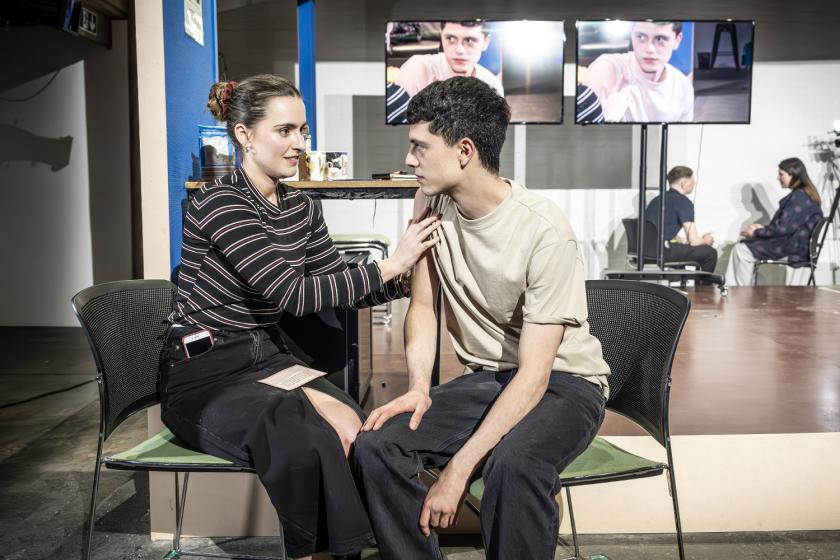We open on one of those grim, grim training rooms that all offices have – the apologetic sofa, the single electric kettle, the instant coffee. The lighting is too harsh, the chairs too hard, the atmosphere already post-lunch on Wednesday and it’s only 10am on Monday. We’ve all been there – designer, Rosie Elnile certainly has.
Where we haven’t been is a war zone which is where our keen, but wary trio, marshalled by a slightly on-edge facilitator are heading. It’s a Médecins Sans Frontières type NGO doing good work within a White Saviour framework, somewhere in the Arabic-speaking world. But the absence of borders soon goes deep into both the characters’ lives and the play’s structure.
 Maria Loucha’s Nicki is never quite a control freak of a trainer but, though she’s keen to start sessions on time and for phones to be put away, she’s soon dashing off for calls. “Sorry. I’ve got to take this one”. All is not well with her life at home – if she even has one.
Maria Loucha’s Nicki is never quite a control freak of a trainer but, though she’s keen to start sessions on time and for phones to be put away, she’s soon dashing off for calls. “Sorry. I’ve got to take this one”. All is not well with her life at home – if she even has one.
Peter Corboy instils Dan, an Irish doctor, with a blunt obstreperousness that he seems unable to limit. He gets told to stop being a dick, but after the first hundred times he heard that, I guess he refrained from taking notice. It’s never quite clear what his motivation is, equally worried about the prospect of dying and unsatisfactory toilets.
The other two trainees have the hots for each other. Sarah (Rosa Robson, pictured above with Luca Kamleh Chapman) is an older, posher doctor on the rebound and Chapman’s Khaled is a younger nurse still grieving for his father, who lost his English and reverted to Arabic in his dying days. Neither know where they are, floundering on shifting sands, each vulnerable in their own way.
If that sounds a little neat in terms of backstories, it is, but that provides a springboard for a sparkling first half. Writer, Sami Ibrahim, nominated for an Olivier for his 2023 play, Two Palestinians Go Dogging, sets up tension in the room through the trainees' role-playing dilemmas that they might face in the field. And they really are fascinating. I’m sure I wasn’t alone in feeling a sense of disappointment when, after a brief discussion of the latest scenario… blackout, thudding beats and another scene starts in a fragmented narrative.
Much of that momentum is wasted in an overly-long second half that loses its way narratively and structurally, director, Jaz Woodcock-Stewart (also Olivier-nominated for 2023’s Paradise Now!) allowing the play to unravel in front of us.
Nicki and Dan, for whom we have a grudging respect and some sympathy, more or less disappear and Sarah and Khaled’s affair takes over the play. It’s not all that interesting – there’s a side plot about unnamed workers in the field under investigation in a ‘Sex for Medicines’ scandal, but there’s no attempt to draw parallels with our putative lovers.
Perhaps to keep us interested or to make some very heavy-handed points about identity, fetishisation in role-play and surveillance, Khaled ‘becomes’ his character in the scenarios, Ali, and Sarah "becomes" hers, Laura. Both are turned on by the conceit, but the passion is barely discernible in a coy sex scene that would hardly merit a 12 certificate in the cinema, but is played out at the very back of the stage, presuambly for fear of frightening the horses.
Suddenly, it’s all hand held cameras and close-ups on screens that somehow drown the action and add little to the play. It’s two and a half hours after the start when the play finishes and it’s not a good sign that it feels even longer, the pace slowing rather than accelerating as the climax approaches. There's talent to burn in the cast and creatives - and it's disappointing that so much of it is.
There’s the kernel of a good play here in the early snappy dialogue, but significant cuts to the script and the gimmicks would be required to bring the focus back to four ordinary, damaged people who are prepared to go and do the jobs that the rest of us won’t.















Add comment